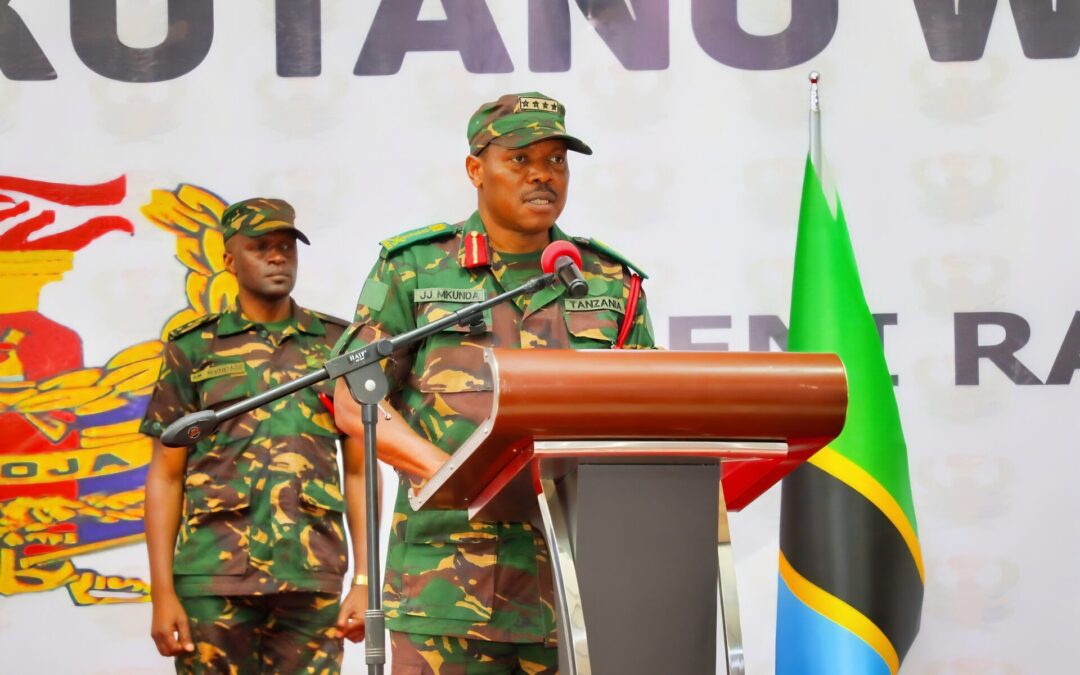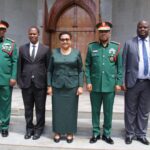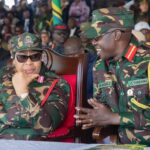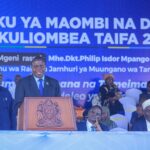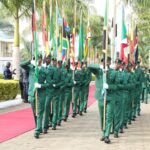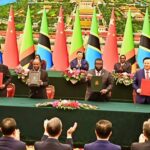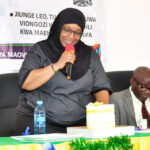Chief of Defence Force and Commanders Meeting Emphasizes National Security, Technological Advancements, and Land Management
On 16 December 2024, the Minister of Defence and the National Defence Force, Hon. Dr. Stergomena Lawrence Tax (Mb), formally inaugurated the Eighth Meeting of the Chief of Defence Forces (CDF) and Commanders of the Tanzania People’s Defence Force (TPDF). The noteworthy occasion was held at the General Jacob Mkunda Hall, which is located within the JKT Msange Battalion in the Tabora Region.
The meeting serves as an annual gathering where high-ranking officials of the TPDF convene to discuss a range of strategic and operational matters. The meeting provides a forum for reflection on the preceding year’s accomplishments, the identification of challenges, and the formulation of future plans. The attendance of Minister Stergomena Tax serves to underscore the significance of this event, as it demonstrates the government’s commitment to providing support and strengthening the Defence Forces.
In her address, Minister Tax praised the Chief of Defence Forces, General Jacob John Mkunda, for maintaining the tradition of holding these annual meetings. This practice, initiated by his predecessor, Retired General Venance Mabeyo, has become a fundamental aspect of the TPDF’s efforts to maintain discipline, professionalism, and solidarity within the ranks.
The selection of the General Jacob Mkunda Hall at the JKT Msange Battalion as the venue for this meeting is also noteworthy. The venue symbolises the unity and strength of the TPDF, as well as the dedication of its members to the defence and security of the nation. The Tabora Region, which has a long history and is of great strategic importance, provides an ideal setting for a gathering of military leaders of such significance.
Commendation of Leadership
Minister Stergomena Tax’s commendation of leadership during her address to the Commanders serves to underscore the significance of continuity and tradition within the Tanzania People’s Defence Force (TPDF). By commending General Jacob John Mkunda, the Chief of Defence Forces, for upholding the practice of convening large annual meetings for Commanders, she emphasises the significance of unwavering leadership and organisational discipline.
The tradition of annual meetings, initiated by the late General Venance Mabeyo, provides a forum for the Commanders to convene, reflect on the preceding year’s accomplishments, address challenges, and formulate strategies for the future. Such practices foster a sense of unity and shared purpose among the leadership of the TPDF. Minister Tax’s endorsement of this practice serves to highlight the professionalism and dedication of the TPDF, as few institutions are able to maintain such a tradition on an ongoing basis.
By upholding this tradition, General Mkunda guarantees that the TPDF remains concentrated on its objectives and continues to function with a high level of discipline and professionalism. Such meetings facilitate open dialogue, strategic planning and the reinforcement of the values and principles that guide the TPDF. Minister Tax’s commendation reflects her appreciation for the efforts of the leadership to maintain these standards and contribute to the overall effectiveness and cohesion of the Defence Force.
Importance of Meetings
Minister Stergomena Tax emphasised the significance of these annual meetings, citing several key reasons for their importance:
Reflection and Consultation
The meetings provide a valuable opportunity for reflection on the past year’s achievements and challenges by the Commanders. By undertaking a review of past achievements and identifying areas for improvement, the Defence Force is able to enhance its performance on an ongoing basis. Furthermore, the meetings provide a forum for consultation on a range of matters pertaining to the Force’s operations. Commanders are able to engage in discourse pertaining to strategic matters, disseminate their insights, and collaborate on the formulation of solutions to the challenges they encounter.
Development of a Common Understanding
One of the principal objectives of these assemblies is to cultivate a unified perspective among the commanders. The meetings facilitate a sense of unity and shared purpose by bringing together leaders from different branches and units. It is of the utmost importance that all members of the Defence Force are in alignment with the organisation’s goals and objectives, and that this common understanding is established. Such an approach facilitates the creation of a unified and coherent methodology for the resolution of challenges and the exploitation of opportunities.
Strengthening Solidarity
Furthermore, the meetings serve an essential function in fostering solidarity within the Defence Force. By facilitating open dialogue and collaboration, they assist in the development of trust and camaraderie among the commanders. Such solidarity is vital for the maintenance of the Force’s morale and effectiveness. When leaders are unified and supportive of one another, a positive and productive environment is created that benefits the entire organisation.
Enhancing Professionalism and Discipline
Minister Tax’s emphasis on the importance of these meetings also serves to underscore the high degree of professionalism and discipline exhibited by the Tanzania People’s Defence Force. The capacity to maintain such gatherings on an annual basis is indicative of the organisation’s dedication to excellence. Such events demonstrate that the Defence Force values continuous improvement and is dedicated to maintaining high standards of performance. Minister Tax’s acknowledgement of their significance emphasises the pivotal role these meetings play in the overall success and efficacy of the Defence Force.
Achievements in the Defence Sector
Minister Stergomena Tax’s commendation of the Defence Sector’s achievements serves to highlight the pivotal role played by the Tanzania People’s Defence Force (TPDF) in the maintenance of national security and the provision of community support. In the preceding year, the TPDF has exhibited its dedication to safeguarding the freedom, peace, and well-being of the Tanzanian populace through a multitude of fruitful initiatives and operations.
Protection of National Security
The TPDF has remained a robust and reliable institution, playing a pivotal role in safeguarding the nation’s safety and security. By effectively addressing security threats and maintaining a state of readiness, the Defence Force has made a significant contribution to the stability and peace of the country. This unwavering dedication to national security serves as a testament to the professionalism and discipline of the TPDF.
Participation in Rescue Operations
Minister Tax made particular mention of the TPDF’s participation in rescue operations in the wake of the Kariakoo Apartment collapse and the Hanang mudslide. In order to save lives and provide assistance to those affected, it was necessary to respond rapidly and in a coordinated manner to the aforementioned incidents. The TPDF’s exemplary conduct in these operations evinces their capacity to respond efficaciously to crises and provide aid to the community in times of adversity.
Community Support and Engagement
In addition to their primary function in national defence, the TPDF has also been engaged in a number of community support initiatives. Their involvement in rescue operations and other civil activities evinces their dedication to serving the people of Tanzania. Such engagement serves to foster trust and reinforce the bond between the Defence Force and the community.
Recognition of Successes
Minister Tax’s expressions of congratulations to the Commanders indicate a recognition of the TPDF’s achievements over the past year. By acknowledging their successes, she reaffirms the significance of their contributions to the nation’s security and well-being. Such recognition serves to motivate the Defence Force to maintain its commitment to excellence in its duties. The achievements in the Defence Sector, as highlighted by Minister Tax, demonstrate the TPDF’s dedication to the protection of the nation and the support of its citizens. The successful operations and community engagement efforts of the TPDF have served to reinforce its role as a vital pillar of the nation, ensuring the freedom, peace, and welfare of the people of Tanzania.
Technological Advancements and Military Industries
Minister Stergomena Tax’s emphasis on technological advancements and the improvement of military industries demonstrates a forward-thinking approach to national defence. Tanzania Media will provide a detailed examination of the implications of this approach:
Enhancing Capabilities Through Technology
Minister Tax recommended that the Tanzania People’s Army exploit technological advancements to augment their operational capabilities in addressing a range of potential threats. This entails the adoption of novel technologies and innovations with the objective of enhancing the efficiency, effectiveness, and responsiveness of the Defence Force. Examples of such initiatives include:
- Advanced Surveillance Systems: The deployment of drones, satellite imagery and other surveillance technologies enables more effective monitoring and response to potential threats.
- Cybersecurity Measures: The implementation of robust cybersecurity protocols is essential for the protection of military infrastructure and sensitive information from cyber-attacks.
- Modern Communication Systems: The objective is to enhance communication networks in order to guarantee uninterrupted and secure communication among military units.
Improving Military Industries
Minister Tax underscored the necessity of enhancing military industrial capabilities in accordance with the Commander-in-Chief’s strategic vision. This entails the advancement and modernisation of the domestic defence industry, with the objective of producing military equipment and supplies of the highest quality. The following aspects are of particular significance:
- Research and Development: The investment of resources in research and development is a key strategy for the advancement of military technologies and equipment.
- Local Manufacturing: The objective is to enhance local manufacturing capabilities with a view to reducing dependency on foreign suppliers and ensuring a steady supply of military goods.
- Collaboration with Private Sector: The collaboration with private sector companies allows for the utilisation of their expertise and resources in the development of military technologies.
Aligning with the Vision of the Commander-in-Chief
The enhancements in technological capabilities and military industries are intended to align with the overarching vision of the Commander-in-Chief. It seems reasonable to posit that this vision encompasses the following:
- Strengthening National Defence: The objective is to guarantee that the Defence Force is adequately equipped and prepared to respond to any potential threats to national security.
- Promoting Self-Reliance: The objective is to construct a self-reliant defence industry that is capable of fulfilling the requirements of the military without placing an undue reliance on external sources.
- Enhancing Global Standing: The objective is to establish Tanzania as a regional and global leader in military innovation and capability.
Minister Tax’s directives on technological advancements and military industries demonstrate a strategic approach to modernising the Tanzania People’s Army. By embracing new technologies and improving domestic military industries, the Defence Force can enhance its capabilities, ensure national security, and align with the vision of the Commander-in-Chief. Such a forward-thinking approach is vital for addressing the contemporary security challenges that Tanzania is currently facing and for maintaining a robust and resilient Defence Force.
Management of Military Resources and Training
Minister Stergomena Tax’s focus on the administration of military resources and the enhancement of military training identifies several pivotal areas that are vital for the efficacy and preparedness of the Tanzania People’s Defence Force (TPDF).
Effective Management of Military Resources
The effective management of military resources requires the strategic and efficient utilisation of all assets, including personnel, equipment and financial resources. This encompasses the following:
- Resource Allocation: The appropriate distribution of resources to different units and operations is essential to guarantee that each is equipped with the necessary tools and support to function optimally.
- Maintenance and Upkeep: The regular maintenance of equipment and facilities is essential to ensure that they remain in good working condition and are ready for use when required. Such measures assist in the prevention of malfunctions and guarantee operational preparedness.
- Financial Management: The efficient management of the Defence Force’s budget is essential to ensure the prudent use of funds and accountability for all expenditures. This entails the prioritisation of expenditure on essential areas, coupled with the avoidance of superfluous expenditure.
Improvement of Military Training
It is of paramount importance to enhance military training in order to maintain a highly skilled and capable defence force. This entails:
- Regular Training Programs: It is essential to conduct regular training exercises in order to maintain personnel readiness for a range of potential scenarios and to ensure that they remain proficient in their duties. Such measures contribute to the maintenance of a high level of operational readiness and adaptability.
- Advanced Training Techniques: The incorporation of advanced training techniques and technologies serves to enhance the overall effectiveness of training programmes. Such methods might include simulations, virtual reality, and other innovative techniques that provide realistic and immersive training experiences.
- Specialized Training: The provision of specialised training for different units is intended to ensure that they are equipped with the specific skills required for their respective roles. Such training might encompass areas such as cybersecurity, counter-terrorism and disaster response.
Importance of Military Diplomacy
Furthermore, Minister Tax underscored the significance of sustaining military diplomacy as a means of confronting an array of security concerns. The term “military diplomacy” encompasses a range of activities, including:
- International Cooperation: The TPDF engages in joint exercises and collaborative endeavours with other countries with the objective of enhancing its capabilities and fostering international relationships. Such initiatives facilitate the formation of alliances and enhance interoperability with other military forces.
- Peacekeeping Missions: The participation in international peacekeeping missions serves to contribute to global security and to gain valuable experience. Furthermore, this contributes to enhancing the reputation of the TPDF and demonstrates Tanzania’s commitment to the maintenance of international peace and stability.
Addressing Security Challenges
By concentrating on the optimal utilisation of military resources, the enhancement of training programmes and the preservation of military diplomacy, the TPDF is better positioned to respond to a range of security challenges. This encompasses the preparation for both conventional and unconventional threats, including cyber-attacks, terrorism, and natural disasters. Such endeavours guarantee that the Defence Force will retain its capacity, resilience, and readiness to safeguard the nation and its interests.
Minister Tax’s directives on the management of military resources and training demonstrate a comprehensive approach to the strengthening of the TPDF. By ensuring the efficient management of resources, providing advanced training, and fostering military diplomacy, the Defence Force can maintain its readiness and effectiveness in addressing security challenges and protecting the nation.
Land Conflicts and Protection
Minister Stergomena Tax’s emphasis on the control and protection of land conflicts serves to underscore the significance of the securing and management of land resources for the Tanzania People’s Defence Force (TPDF), which is also known as JWTZ. This section will provide a more detailed examination of the aforementioned subject matter.
Control and Protection of Land Conflicts
Land conflicts can arise from disputes over land ownership, boundaries, and usage rights. These conflicts can lead to legal battles, social unrest, and hinder the effective use of land for military and other purposes. By calling for the control and protection of land conflicts, Minister Tax aims to ensure that the TPDF can operate without disruptions and maintain its strategic land assets:
Obtaining Title Deeds
Minister Tax advised the Army to facilitate the acquisition of title deeds for the areas under its ownership. A title deed is a legal document that serves to prove ownership of a property and delineate its boundaries. The possession of title deeds for military land is of great consequence for a number of reasons:
- Legal Security: Title deeds serve to provide legal recognition of ownership, thereby affording protection to the land in question from any unauthorised claims or disputes.
- Clear Boundaries: They assist in the precise delineation of the property’s boundaries, thereby mitigating the potential for boundary disputes with neighbouring landowners.
- Asset Management: The implementation of title deeds enables more effective management and utilisation of land assets, thereby ensuring that the land is employed in an optimal manner for military purposes.
Surveying Unsurveyed Areas
Furthermore, Minister Tax emphasised the necessity of conducting surveys in areas that have not yet been surveyed in order to obtain title deeds. Surveying is the process of measuring and mapping land in order to determine its boundaries and features. This process is of the utmost importance for the following reasons:
- Accurate Documentation: The process of surveying provides an accurate and up-to-date representation of the land, which is a prerequisite for the acquisition of title deeds.
- Conflict Resolution: The system assists in the resolution of extant land disputes by furnishing unambiguous and accurate boundary data.
- Planning and Development: A survey of the land in question allows for a more optimal planning and development of the area for military infrastructure and other potential uses.
By prioritising the management of land disputes, the acquisition of title deeds and the demarcation of previously unmapped territories, the Minister of Taxation seeks to guarantee that the TPDF can safeguard its real estate assets and function optimally. It is of the utmost importance to implement these measures in order to maintain the legal security, management, and development of military land, which will ultimately contribute to the overall strength and readiness of the Defence Force.
Recognition of Efforts and Government Support
Minister Stergomena Tax’s acknowledgement of the contributions and assistance provided by the Tanzania People’s Defence Force (JWTZ) and other defence and security agencies underscores the pivotal role they play in maintaining peace and security within the country.
Ensuring Peaceful Elections
Minister Tax expressed gratitude to JWTZ and other Defence and Security Agencies for their contributions to ensuring peaceful Local Government elections. Their visible and active presence helped to maintain order and prevent any potential conflicts or disruptions. This outcome serves to illustrate the vital role played by the Defence Force in the protection of the democratic process and the assurance of a smooth and fair electoral process.
Focus on Social and Economic Security
In anticipation of the forthcoming general elections, the Minister for Taxation called upon the JWTZ to prioritise the twin objectives of social and economic security. This encompasses not only the maintenance of peace and order but also the addressing of broader issues that affect the well-being of the population. By concentrating on social and economic security, the Defence Force can assist in the creation of a stable environment that is conducive to economic growth and social development.
Government Support and Empowerment
Minister Tax acknowledged the efforts of the government, led by President Dr. Samia Suluhu Hassan, to enhance the capabilities of the army. This support encompasses the following:
- Providing Modern Tools and Equipment: It is of the utmost importance to guarantee that the Defence Force is furnished with the most up-to-date technology and equipment, in order to enable them to fulfil their duties in an effective manner.
- Facilitating Exercises: The organisation and provision of training exercises is a key aspect of ensuring the Defence Force is adequately prepared and able to respond effectively to a range of potential threats and challenges.
- Improving Interests of the Armed Forces: The objective is to address the needs and welfare of the Armed Forces, including improvements to living conditions, the provision of adequate healthcare, and the assurance of fair compensation.
Minister Tax’s acknowledgement of the contributions of JWTZ and other Defence and Security Agencies, coupled with the Government’s endorsement, exemplifies a collaborative strategy for maintaining peace and security in Tanzania. The government’s objective is to establish a stable and prosperous environment for all citizens by focusing on social and economic security and empowering the Defence Force.
In her concluding remarks, Minister Stergomena Tax underscored the pivotal function of robust and efficacious plans and objectives in the accomplishment of the Tanzania People’s Defence Force (TPDF). By reiterating this point, she emphasised the necessity for the Defence Force to have clear, strategic objectives and well-thought-out plans in place to guide its actions and ensure its continued effectiveness.
Gratitude to Leadership
Minister Tax conveyed her appreciation to the Chief of Defence Forces, General Jacob Mkunda, for his exemplary leadership and commitment to strengthening the capabilities of the Army. This acknowledgement serves to highlight the pivotal role of robust leadership in upholding the discipline, professionalism and operational readiness of the TPDF. General Mkunda’s commitment to maintaining the tradition of annual meetings and fostering a culture of continuous improvement has been pivotal in enabling the Defence Force to achieve its objectives.
Commitment to Strengthening the TPDF
The Minister’s directives and commendations demonstrate a broader commitment to the enhancement of the TPDF. This encompasses the following:
- Enhancing Capabilities: By concentrating on technological developments, enhanced training programmes and the effective management of resources, the TPDF will be better equipped to respond to a range of security challenges and maintain its operational readiness.
- Supporting Personnel: In recognition of the significance of the well-being and professional advancement of military personnel, the government has implemented measures to enhance living standards, guarantee sufficient healthcare, and guarantee fair remuneration.
- Fostering Military Diplomacy: The participation of the TPDF in international cooperation and peacekeeping missions serves to cultivate alliances and to enhance the capabilities and reputation of the TPDF on the global stage.
Ensuring Security and Welfare
In addition, Minister Tax underscored the importance of the TPDF in safeguarding the nation’s security and well-being. By maintaining a robust and effective Defence Force, Tanzania can safeguard its national interests, protect its citizens, and contribute to regional and global stability.
In conclusion, Minister Tax emphasised the significance of strategic planning, robust leadership and a dedication to continuous improvement as key factors in the success of the TPDF. Her gratitude to General Mkunda and the directives issued reflect a dedication to the empowerment of the Defence Force and the assurance of the security and welfare of the nation.
Tanzania Media
- Kanyala Ferry Launch: TEMESA’s New Service for 15,000 Sengerema Residents (Mwanza) - 18 August 2025
- Russia-Tanzania Naval Cooperation: How the Smolny Training Ship Boosts Dar es Salaam’s Maritime Security - 18 August 2025
- Tanzania’s ICGLR Commitment: Stabilising the DRC & Great Lakes Region - 18 August 2025

